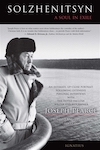The centennial of Alexander Solzhenitsyn’s birth passed in 2018 with surprisingly little fanfare. Perhaps this reflects contemporary culture’s obsession with the present and forgetfulness regarding the past. Perhaps it reflects elite ambivalence about the author, whose critique of Soviet crimes was accepted but whose critique of Western moral relativism was rejected.
Whatever the reason Solzhenitsyn’s centennial was largely passed over, I decided on December 11, 2018—his one hundredth birthday—to reacquaint myself with the man and his writings in 2019. My first stop was the revised and updated edition of Joseph Pearce’s Solzhenitsyn: A Soul in Exile. The first edition was published in 1999 after Solzhenitsyn turned eighty. This edition appeared in 2011, three years after his death.
Unlike other Solzhenitsyn scholars, Pearce does not speak or read Russian. His biography is therefore dependent on other scholars who do, such as Michael Scammel’s 1985 Solzhenitsyn: A Biography, and English translations of Solzhenitsyn’s work by various scholars. The core of Pearce’s original research is his extended interview with the author in Moscow in 1998, which was simultaneously translated by Solzhenitsyn’s son Yermolai. Insights from this interview are scattered throughout the book.
Despite Pearce’s dependence on other Russian-literate scholars, I found Pearce’s biography helpful for three basic reasons. First, it summarized the events of Solzhenitsyn’s life from birth to death. As far as I can tell, this is the only English-language biography to do so currently in print. That in and of itself is helpful.
Second, it highlights the spiritual and moral vision at the core of Solzhenitsyn’s literary output. This vision runs through the center of Solzhenitsyn’s critique of Soviet crimes, of Western moral relativism, and of political and social developments in post-Soviet Russia. To understand Solzhenitsyn, Pearce argues, one must understand his Russian Orthodox faith. Pearce demonstrates how that worldview shaped Solzhenitsyn’s views on history, society, politics, and economics.
Third, Pearce shines a sympathetic light on the controversies that began to engulf Solzhenitsyn once he was exiled from the Soviet Union in 1974, controversies that dog his reputation to the present day. While praising Solzhenitsyn’s pre-exile dissidence, Western authors—and some Russian authors—continue to portray Solzhenitsyn as illiberal, authoritarian, nationalistic, and anti-Semitic. Pearce makes a strong case that these portraits misinterpret Solzhenitsyn.
For me, the key test of a biography is twofold: Did it get its facts straight, and did it make me more interested in the subject as a result of reading it. By that test, Solzhenitsyn: A Soul in Exile succeeds. Next up for me: A Day in the Life of Ivan Denisovich, Solzhenitsyn’s first book, the one that established his literary reputation.
 Book Reviewed
Book Reviewed
Joseph Pearce, Solzhenitsyn: A Soul in Exile, rev. and updated ed. (San Francisco: Ignatius Press, 2011).
P.S. If you liked my review, please click “Helpful” on my Amazon review page.

